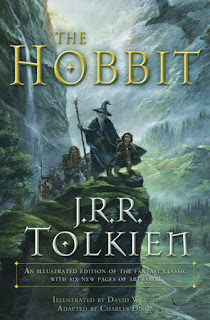For this week, I read “The Hobbit.”
This was my first time reading anything from The Lord of the Rings as I’ve
never really had that much interest in it. I was vaguely familiar with some of
the lore and the characters before reading it, but not much else.
I can definitively say that the
story reflects the Hero’s Journey very well. The protagonist, Bilbo, is called
to a quest, refuses the call at first, he faces trials and tribulations, completes
the task, and eventually returns home. Numerous characters also follow the
archetypes, such as Gandalf fulfilling the role of the Mentor. I can
definitively see why so many people reference the LOTR novels as pure examples
of using the classic Hero’s Journey to tell its story; and it is not implemented
that way without reason. The story follows that formula not only to give it
structure, but also because it is part of the emotional change and development
that Bilbo goes through. He goes from someone who does not want to venture out
into the outside world (preferring to stay in his comfort zone), to going out
and having this adventure. He grows a lot as a person through that journey. The
journey was important to the overall character arc, and not just used as a
cookie-cutter formula to follow. I found the book to be very enjoyable, despite it not
adhering initially to my personal tastes. I think it was definitively a good
introduction for me to The Lord of the Rings world.


